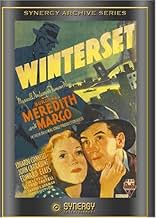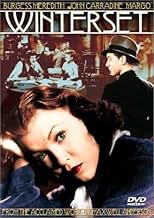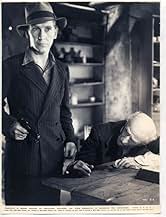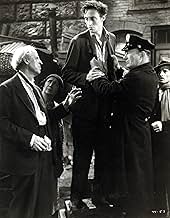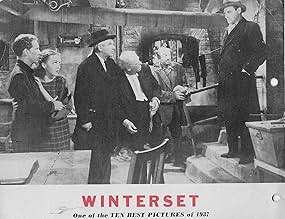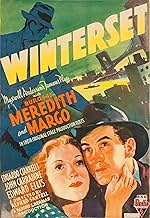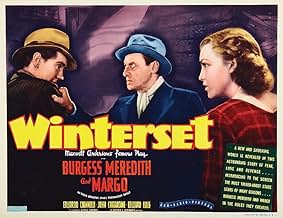Agrega una trama en tu idiomaImmigrant radical Bartolomeo Romagna is falsely condemned and executed for a payroll robbery. Years later, his son Mio sets out to find the truth of the crime and to bring to account the gan... Leer todoImmigrant radical Bartolomeo Romagna is falsely condemned and executed for a payroll robbery. Years later, his son Mio sets out to find the truth of the crime and to bring to account the gangster Trock Estrella.Immigrant radical Bartolomeo Romagna is falsely condemned and executed for a payroll robbery. Years later, his son Mio sets out to find the truth of the crime and to bring to account the gangster Trock Estrella.
- Dirección
- Guionistas
- Elenco
- Nominado a 2 premios Óscar
- 4 premios ganados y 4 nominaciones en total
Murray Alper
- Louie
- (sin créditos)
- Dirección
- Guionistas
- Todo el elenco y el equipo
- Producción, taquilla y más en IMDbPro
Opiniones destacadas
The chance to see Broadway players recreate their performances on film back in the day should never be missed. Burgess Meredith, Margo, and Eduardo Ciannelli recreate their stage roles from Winterset in this 1936 film. But the story itself is horribly dated, mostly with a lot of left wing rhetoric which gets in the way of the plot.
Probably back in 1936 no one cared as the cause of Sacco&Vanzetti was still fresh in everyone's mind. Today it is still debated by historians and legal scholars and the two working class Italian-Americans are still venerated in Italian-American households of a more liberal persuasion in their politics. But the average American today knows the case vaguely if at all today.
The men went to the electric chair in Massachusetts protesting their innocence as does John Carradine in this film. Before Carradine dies he imparts a sense of mission to his son who grows up to be Burgess Meredith to find the real guilty parties.
A review of the case by a law school class saying that the state electrocuted the wrong man brings new attention to the case, not something that Eduardo Ciannelli likes. He was the real trigger man in the case and now he's a big shot gangster.
Rather improbable events bring Meredith, Ciannelli, the judge Edward Ellis now a drunken derelict, Paul Guilfoyle another accomplice, Guilfoyle's father Maurice Moscovitch and his sister Margo all together on a rainy and stormy night.
Maxwell Anderson wrote the original play and I have to contrast it with another of his plays that made it to the screen, Key Largo. It was another film where various folks are trapped in a storm and interesting things happen. Winterset never really sheds its stage origins and can't shake the rhetoric. Contrast that to Key Largo which never loses your interest for a second and while most of the action takes place in a closed down out of season hotel where the cast is holed up you never get any sense of staginess in it. The rhetoric is there, but it never gets in the way of the story as in Winterset.
Even with Oscar nominations for Art Direction and Musical scoring Winterset is a relic of bygone days.
Probably back in 1936 no one cared as the cause of Sacco&Vanzetti was still fresh in everyone's mind. Today it is still debated by historians and legal scholars and the two working class Italian-Americans are still venerated in Italian-American households of a more liberal persuasion in their politics. But the average American today knows the case vaguely if at all today.
The men went to the electric chair in Massachusetts protesting their innocence as does John Carradine in this film. Before Carradine dies he imparts a sense of mission to his son who grows up to be Burgess Meredith to find the real guilty parties.
A review of the case by a law school class saying that the state electrocuted the wrong man brings new attention to the case, not something that Eduardo Ciannelli likes. He was the real trigger man in the case and now he's a big shot gangster.
Rather improbable events bring Meredith, Ciannelli, the judge Edward Ellis now a drunken derelict, Paul Guilfoyle another accomplice, Guilfoyle's father Maurice Moscovitch and his sister Margo all together on a rainy and stormy night.
Maxwell Anderson wrote the original play and I have to contrast it with another of his plays that made it to the screen, Key Largo. It was another film where various folks are trapped in a storm and interesting things happen. Winterset never really sheds its stage origins and can't shake the rhetoric. Contrast that to Key Largo which never loses your interest for a second and while most of the action takes place in a closed down out of season hotel where the cast is holed up you never get any sense of staginess in it. The rhetoric is there, but it never gets in the way of the story as in Winterset.
Even with Oscar nominations for Art Direction and Musical scoring Winterset is a relic of bygone days.
From RKO studios in 1936 (though it looks as though it were made in the earliest 30s), during the heyday of the Astaire-Rogers musicals, came something rich and strange. Maxwell Anderson's very serious poetic play was boiled down into a movie that's part Depression-era gangster flick, part Shavian social-issue drama, and part neo-Greek tragedy.
The igniting fuse was the Nicola Sacco/Bartolomeo Vanzetti case of 1927, where two immigrant anarchists were condemned (some would say railroaded) to death supposedly for a robbery in which guards were killed. Anderson pushes it back to 1920 and focuses on a single man, Bartolomeo Romagna (John Carradine), whose auto, filled with anarchist/socialist tracts, is stolen for a similar crime by gangster Eduardo Cianelli. When condemned, Carradine eloquently rebukes the judge (Edward Ellis).
The film now flashes forward to 1936, when Romagna's down-and-out drifter son (Burgess Merdith), spurred by revisionist theories of the case, journeys to New York to confront the surviving principals, including Cianelli, Ellis and a reluctant witness (Paul Guildfoyle). All converge for a reckoning preordained by The Fates....
Anderson has heightened his dialogue to lend it immortal aspirations (which may have been a grandiose miscalculation the dominant rhetorical mode of the twentieth century, obvious even by 1936, is flatting). The high-flown posture extends to the look of the film, too a stylized nightscape that's a harbinger of the look of film noir to come a few years later. A low-ceilinged tenement-basement flat is oppressively claustrophobic (markedly so, given the number of actors crammed into it), while the cobblestones and stone arches of the low-rent streets near New York's waterfront glisten wickedly in the pelting rain. (At times the slums look like the central squares of those Transylvanian villages so common in Universal horror pix of this era).
Almost every element of Winterset should seem laughable now but doesn't (though there are a few close shaves). There's an early sequence involving a hurdy-gurdy that lures the slum-dwelling underclass out of its burrows to dance that's hauntingly powerful as is the face of Winterset's love interest, an actress known as Margo, that harks back to the expressiveness of the silents.
The igniting fuse was the Nicola Sacco/Bartolomeo Vanzetti case of 1927, where two immigrant anarchists were condemned (some would say railroaded) to death supposedly for a robbery in which guards were killed. Anderson pushes it back to 1920 and focuses on a single man, Bartolomeo Romagna (John Carradine), whose auto, filled with anarchist/socialist tracts, is stolen for a similar crime by gangster Eduardo Cianelli. When condemned, Carradine eloquently rebukes the judge (Edward Ellis).
The film now flashes forward to 1936, when Romagna's down-and-out drifter son (Burgess Merdith), spurred by revisionist theories of the case, journeys to New York to confront the surviving principals, including Cianelli, Ellis and a reluctant witness (Paul Guildfoyle). All converge for a reckoning preordained by The Fates....
Anderson has heightened his dialogue to lend it immortal aspirations (which may have been a grandiose miscalculation the dominant rhetorical mode of the twentieth century, obvious even by 1936, is flatting). The high-flown posture extends to the look of the film, too a stylized nightscape that's a harbinger of the look of film noir to come a few years later. A low-ceilinged tenement-basement flat is oppressively claustrophobic (markedly so, given the number of actors crammed into it), while the cobblestones and stone arches of the low-rent streets near New York's waterfront glisten wickedly in the pelting rain. (At times the slums look like the central squares of those Transylvanian villages so common in Universal horror pix of this era).
Almost every element of Winterset should seem laughable now but doesn't (though there are a few close shaves). There's an early sequence involving a hurdy-gurdy that lures the slum-dwelling underclass out of its burrows to dance that's hauntingly powerful as is the face of Winterset's love interest, an actress known as Margo, that harks back to the expressiveness of the silents.
Winterset starts out beautifully and profoundly. The story flows well, but the latter scenes are so implausibly constrained that I ended up losing sympathy for the characters. The dialog was hard to make sense of at times, and many of the movie's sequences look like dark scenes from a bad dream... you know, the kind of situation you just can't escape from.
It looks as though, in the transition to turning the stage play into a movie, the makers never gave much thought to overcoming the obvious limitations that the stage imposes on what we now think of as the "action sequences".
I don't regret the time spent watching Winterset. It was interesting, but as a movie (and even allowing for its vintage) it was just "OK".
It looks as though, in the transition to turning the stage play into a movie, the makers never gave much thought to overcoming the obvious limitations that the stage imposes on what we now think of as the "action sequences".
I don't regret the time spent watching Winterset. It was interesting, but as a movie (and even allowing for its vintage) it was just "OK".
The drama itself is interesting to watch in this adaptation of Maxwell Anderson's play, and the themes that it brings out include some particularly weighty ones. The solid cast included at least three performers who were continuing their Broadway roles, and while the production does have a stagy feel at times, it often seems rather appropriate to the material.
The brief prologue shows a political extremist (who is presumably also an immigrant) wrongly accused and executed for a murder committed by a holdup gang. The circumstances are similar to those in some notorious real cases of a slightly earlier era, in which politically unpopular persons were railroaded into convictions because of the public's fear of their beliefs.
The main action starts with Burgess Meredith portraying the executed man's son, now an adult, and determined to get to the bottom of the case despite the obstacles that have come with time. In the course of things, he encounters the judge who had presided over his father's trial, a witness with important information, and a brutal crime boss who is determined to prevent the case from being re-opened. The setup produces some good psychological and ethical tensions, in addition to the drama on the surface.
Most of the supporting cast performs well. John Carradine has a brief role as the father, Margo has a good and important role as a young woman torn between family loyalty and her attraction to Meredith's character, and Eduardo Ciannelli believably portrays the soulless, desperate crime boss. Mischa Auer succeeds in a brief, atypical role as a street agitator. But Edward Ellis gives the best performance, as the judge whose conscience has been tormented ever since the fateful case. The characters and the tragic situation that links them are all effectively portrayed.
The brief prologue shows a political extremist (who is presumably also an immigrant) wrongly accused and executed for a murder committed by a holdup gang. The circumstances are similar to those in some notorious real cases of a slightly earlier era, in which politically unpopular persons were railroaded into convictions because of the public's fear of their beliefs.
The main action starts with Burgess Meredith portraying the executed man's son, now an adult, and determined to get to the bottom of the case despite the obstacles that have come with time. In the course of things, he encounters the judge who had presided over his father's trial, a witness with important information, and a brutal crime boss who is determined to prevent the case from being re-opened. The setup produces some good psychological and ethical tensions, in addition to the drama on the surface.
Most of the supporting cast performs well. John Carradine has a brief role as the father, Margo has a good and important role as a young woman torn between family loyalty and her attraction to Meredith's character, and Eduardo Ciannelli believably portrays the soulless, desperate crime boss. Mischa Auer succeeds in a brief, atypical role as a street agitator. But Edward Ellis gives the best performance, as the judge whose conscience has been tormented ever since the fateful case. The characters and the tragic situation that links them are all effectively portrayed.
Call it Vintage, if you will, but you will not call Winterset boring unless a world of interesting details bore you. The movie is full of sub-stories, full of details that bring back the early days of everyday troubled life for Americans, especially New Yorkers. While not actually typical, the story is one that hangs together.
I suspect the story plot and actor management of the story were perfected on Broadway long before going to film. It is both engaging and fascinating for movie buffs who are students of the perfected B/W film and is a study in filmography which makes one wonder if this is not the height of perfection, if you will, concerning films of that genre: Good story, good delivery and good conclusion.
The story is not one with a tragic ending for the principles. It is not one that builds up the viewer's expectations and hopes and then dashes them in the end. While there are hints of evil and tragedy, the people most deserving receive this end, the ones who deserve the best of the ending actually do get the best in the end.
The organ music is superb for selection and for an almost hypnotic melody that plays on in one's head for some time afterward. A nice, pleasant melody. And on it hangs the turning point in the movie, a grand hook to hang the ending.
The antics of the policeman is what one would expect of one of New York's finest of that era. A masterful job of acting.
Most of all, Margo! She was again engaging, spell-binding and her job well-done. She caused the viewer to want to provide her sympathy from a good and kind father, who was incapable of doing all he could for his children, and to a brother who was caught up in a crime and later regretted it and who endeavored to correct his mistake. Again, superb acting.
Overall, Winterset stands out as one of the most enjoyable movies I have ever watched. I try to share it with friends who have never seen it before. None who see it for the first time have been disappointed.
I suspect the story plot and actor management of the story were perfected on Broadway long before going to film. It is both engaging and fascinating for movie buffs who are students of the perfected B/W film and is a study in filmography which makes one wonder if this is not the height of perfection, if you will, concerning films of that genre: Good story, good delivery and good conclusion.
The story is not one with a tragic ending for the principles. It is not one that builds up the viewer's expectations and hopes and then dashes them in the end. While there are hints of evil and tragedy, the people most deserving receive this end, the ones who deserve the best of the ending actually do get the best in the end.
The organ music is superb for selection and for an almost hypnotic melody that plays on in one's head for some time afterward. A nice, pleasant melody. And on it hangs the turning point in the movie, a grand hook to hang the ending.
The antics of the policeman is what one would expect of one of New York's finest of that era. A masterful job of acting.
Most of all, Margo! She was again engaging, spell-binding and her job well-done. She caused the viewer to want to provide her sympathy from a good and kind father, who was incapable of doing all he could for his children, and to a brother who was caught up in a crime and later regretted it and who endeavored to correct his mistake. Again, superb acting.
Overall, Winterset stands out as one of the most enjoyable movies I have ever watched. I try to share it with friends who have never seen it before. None who see it for the first time have been disappointed.
¿Sabías que…?
- TriviaBurgess Meredith, in his first film with a credited role, recreates the role he played in the original Broadway production.
- ConexionesFeatured in Sprockets: Masters of Menace (1995)
Selecciones populares
Inicia sesión para calificar y agrega a la lista de videos para obtener recomendaciones personalizadas
- How long is Winterset?Con tecnología de Alexa
Detalles
- Fecha de lanzamiento
- País de origen
- Idiomas
- También se conoce como
- Under New Yorks broar
- Locaciones de filmación
- Productora
- Ver más créditos de la compañía en IMDbPro
- Tiempo de ejecución
- 1h 17min(77 min)
- Color
- Relación de aspecto
- 1.37 : 1
Contribuir a esta página
Sugiere una edición o agrega el contenido que falta

